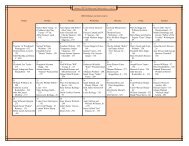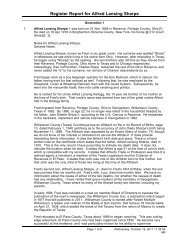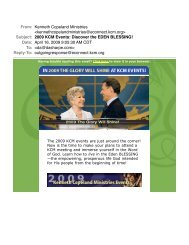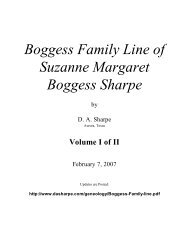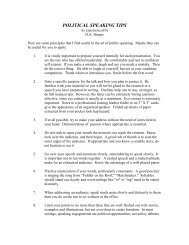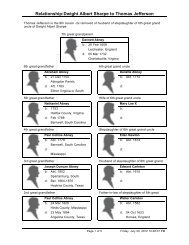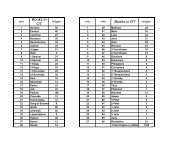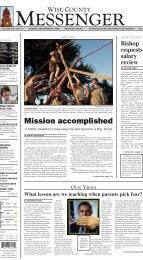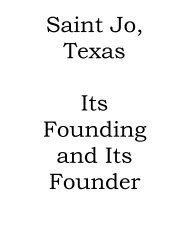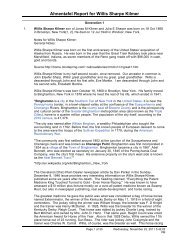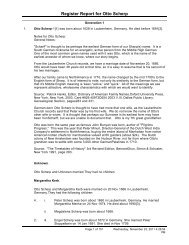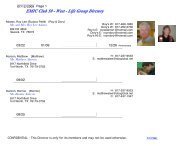My Descending from Gov. - D. A. Sharpe
My Descending from Gov. - D. A. Sharpe
My Descending from Gov. - D. A. Sharpe
You also want an ePaper? Increase the reach of your titles
YUMPU automatically turns print PDFs into web optimized ePapers that Google loves.
Register Report for William Bradford<br />
Generation 5<br />
line comes through my father's line that goes <strong>from</strong> <strong>Sharpe</strong> to Sharp to Kellogg to Steele to<br />
Bradford.<br />
Noah is a famous lexicographer. His early attempts produced "American Spelling Book,"<br />
which became the best-selling book in 1783.<br />
Source:Richard Skenkman & Kurt Reiger, "One-Night Stands with AmericanHistory,"<br />
Perennial - Harper Collins Publishers, 2003, 10 East 53th Street, New York NY 10022, page<br />
17.<br />
He published his famous Dictionary, the American Dictionary of the English Language, in<br />
1828, and it has been republished in recent years in its original version. It contained many<br />
definitions that included Biblical nomenclature in the descriptions. Most of these newly<br />
published versions are found in Bible book stores. Suzanne gave me a copy for Father's<br />
Day in 2001, and it is very interesting to browse.<br />
Another ancestry interest about Noah is John Webster. His third great grandfather is <strong>Gov</strong>.<br />
John Webster, who was the fifth <strong>Gov</strong>ernor of Connecticut Colony.<br />
This biographical sketch about Noah <strong>from</strong> the Internet below is enlightening:<br />
"Noah Webster was born on October 16, 1758, in the West Division of Hartford. Noah's was<br />
an average colonial family. His father farmed and worked as a weaver. His mother worked<br />
at home. Noah and his two brothers, Charles and Abraham, helped their father with the<br />
farm work.Noah's sisters, Mercy and Jerusha, worked with their mother to keep house and<br />
to make food and clothing for the family.<br />
"Few people went to college, but Noah loved to learn so his parents let him go to Yale,<br />
Connecticut's only college. He left for New Haven in 1774, when he was 16. Noah's years<br />
at Yale coincided with the Revolutionary War. Because New Haven had food shortages<br />
during this time, many of Noah's classes were held in Glastonbury.<br />
"Noah graduated in 1778. He wanted to study law, but his parents could not afford to give<br />
him more money for school. So, in order to earn a living, Noah taught school in<br />
Glastonbury, Hartford and West Hartford. Later he studied law. [Additional fact: in 1784<br />
Connecticut started the first law school in America, which graduated Noah Webster]<br />
"Noah did not like American schools. Sometimes 70 children of all ages were crammed into<br />
one-room schoolhouses with no desks, poor books, and untrained teachers. Their books<br />
came <strong>from</strong> England. Noah thought that Americans should learn <strong>from</strong> American books, so in<br />
1783, Noah wrote his own textbook: 'A Grammatical Institute of the English Language.' In<br />
1783 Noah also produced what is considered to be the first dictionary created in the US.<br />
Most people called it the 'Blue-backed Speller' because of its blue cover, though it was<br />
somewhat limited in comparison to the later publication in 1828.<br />
"For 100 years, Noah's book taught children how to read, spell, and pronounce words. It<br />
was the most popular American book of its time.Ben Franklin used Noah's book to teach his<br />
granddaughter to read.<br />
"In 1789, Noah married Rebecca Greenleaf. They had eight children. Noah carried raisins<br />
and candies in his pockets for the children to enjoy. The Websters lived in New Haven,<br />
then moved to Amherst, Massachusetts. There, Noah helped to start Amherst College.<br />
Later the family moved back to New Haven. On December 9, 1793 Noah Webster founded<br />
New York's first daily newspaper.<br />
"When Noah was 43, he started writing the first American dictionary. He did this because<br />
Americans in different parts of the country spelled, pronounced and used words differently.<br />
He thought that all Americans should speak the same way. He also thought that Americans<br />
Page 29 of 182 Tuesday, December 11, 2012 11:29:07<br />
AM



